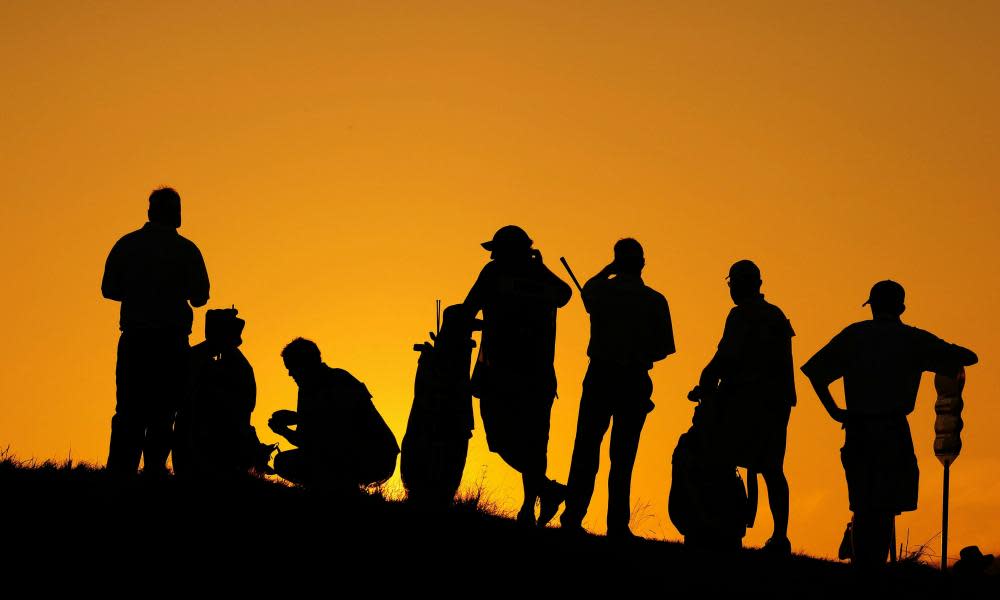Golf fumbles around for appropriate relationship with betting | Ewan Murray

Contemplate the scenario: round two of an Open Championship, Golfer X is flirting with the cut line when playing his 36th hole. Cue back-to-back drives out of bounds and confirmation of an early exit.
Short of using a lie detector test – and even that has its flaws – it would be impossible to determine this act as deliberate. This is why golf, more than most other sports, is so susceptible to betting irregularity. Any individual, in a relatively straightforward act, can prevent themselves from succeeding. And golf, like everything else nowadays, has a variety of betting markets that render even the most trivial of scenarios as open to abuse.
Lower-grade tours would be the logical starting point if anyone wanted to uncover suspicious gambling activity in golf. There has never been any suggestion of gambling syndicates influencing golf at the top level. And why would it? The sport’s leading lights earn quite enough money without finding themselves in the grip of nefarious individuals demanding that they miss putts. That said, plenty of them enjoy a wager.
Golf’s relationship with betting is a curious one. On one hand, the rapid growth of markets within this sport – combined with more tipster columns than ever before – intensifies attention, particularly for television viewers. On the other, golf seems at pains to keep betting at arm’s length through a – not entirely illegitimate – fear of being compromised.
Last year, the European Tour’s chief executive, Keith Pelley, expressed unease over the theoretical situation of a gambling company wanting to sponsor a tournament. That is hardly a wild idea; betting firms are investing heavily across all sports, to a level many regard as excessive. When the Scottish Open took place at its previous home of Loch Lomond, Ladbrokes had an on-site bookmakers; for several years now, that has not been the case.
Pelley’s organisation has firm rules. Any tour member or “related personnel” – including management, caddie, spouse, partner as accredited for an event – is forbidden from betting or instructing someone else to bet on “any professional or elite amateur golf tournament anywhere in the world”.
While the policy appears stringent on paper, you need not go far at a European Tour event to source betting by “related personnel”. The wider debate relates to whether that is actually problematic. Sporadically, betting trends in golf leap out; immediately before Ryder Cup wildcards are picked being a prime example. But would the use of insider knowledge be seriously harmful?
This week, the R&A’s chief executive, Martin Slumbers, swatted away the suggestion that golf’s oldest major could bow to commerce and permit on-site betting.
“We have the wifi system that allows the online betting,” Slumbers said. “We just don’t particularly want to have bookmakers in the Open Championship in the golf course. People can absolutely do it outside the course, they can do it across their wifi with their online accounts but we just don’t want to have it inside the ropes.”
This sounded suspiciously like: “We don’t want that sort here.”
Slumbers added: “I think there’s danger in all sport of inappropriate betting. I’d hate to see crowds getting overly involved in their enthusiasm for a particular player or hole or shot because of their betting position. I think that would be detrimental.
“For the very first time in 2016, we actually became part of a sports monitoring service that was looking at all the betting that’s going on around the Open and monitoring any potential dangers, which there weren’t any. We just didn’t feel it was appropriate to have it inside the ropes. We think it detracts from the overall position of what we’re trying to do.”
Slumbers’ stance is not without flaws. By his own admission, fans could very easily become “overly involved” from a “betting position” as made via mobile phone. Where they place the bet is irrelevant. The R&A also cannot turn into moral beacons over this; alcohol is sold by the gallon at the Open and commonly taken to excess, so we are not dealing with an angelic form of spectator sport here.
Maybe golf has absolutely nothing to worry about. Maybe the caution of Slumbers is to be applauded. It appears, though, that golf is rather fumbling around for the appropriate way to develop a relationship with a market that could undermine sporting integrity, just as it has elsewhere.

 Yahoo News
Yahoo News 
